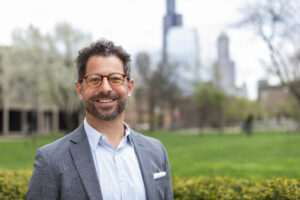Chicago is not doing enough to address the “sad state of family housing,” a leading affordable housing advocate told several Chicago City Council members last week.
“How are we servicing families?” asked Kevin Jackson, executive director of the Chicago Rehab Network, after the Housing and Real Estate Committee received a quarterly update from the Department of Housing‘s Acting Commissioner Ellen Sahli.
Commissioner Sahli said several new development projects have been constructed in neighborhoods around the city, including Kenwood and Lawndale. She also highlighted the department’s outreach efforts, which include holding expos and targeting grants to specific groups of residents who need housing assistance.
This is the second year of the city’s five-year $1.5 billion housing plan. So far in 2007 the Department of Housing has spent more than $235 million on about 6,000 housing units, according to a Department press release, and by year’s end the Department expects to commit over $537 million in resources to support 12,309 units of housing.
“We are on target,” Sahli said of her department’s progress. Although she noted the second quarter spending was not a ‘full fourth’ of this year’s budget, Sahli said it was due to building cycles. She predicted that the third quarter building boom would more than make up for the slower growth during the period from April to June.
After the city official spoke, the Chicago Rehab Network’s Jackson gave his analysis of the housing report to committee members. Jackson praised the department’s work but said more money should be spent on affordable housing in Chicago.
The city’s housing budget this year is $31.4 million, Jackson said, but he believes the Chicago Department of Housing should receive $40 million next year, since it has not been spending enough on public housing projects.
Ald. Ray Suarez (31st), chairman of the Housing and Real Estate Committee, admitted the city “can do more,” but insisted that the report “shows that the city of Chicago is working.”
Suarez said no city does more for affordable housing than Chicago and there are no additional funds to expand the department’s budget. He suggested the private sector could step in but noted it is unlikely unless businesses could make enough money investing in affordable housing.
“The bottom line is profit,” Suarez said. “If they can’t make a profit, they won’t do it.”
Jackson said the city shouldn’t depend on private funding because the role of government is to “be involved where the market is not involved.” Jackson believes investing in affordable housing should be a main priority of the department.
“We called for the city to do more…because the payoff over time is incalculable,” Jackson said.
Jackson’s entreaty fell on a quiet room. The only members of the Housing Committee present, other than Chairman Suarez were Aldermen Lona Lane (18th), Sharon Dixon (24th) and Ariel Reboyras (30th). The aldermen only asked a few clarifying questions of Jackson and Sahli.
Journalist Mick Dumke also noted the low attendance of committee members at the housing meeting in a posting on a Chicago Reader blog last week.
Aldermen Pat Dowell (3rd), John Pope (10th), James Balcer (11th), Billy Ocasio (26th), Scott Waguespack (32nd), Richard Mell (33rd), Carrie Austin (34th), William Banks (36th) and Bernie Stone (50th) also serve on the committee but were absent from the Sept. 19th meeting.
Jackson had no comment when asked for his reaction to the low aldermanic turnout but said government should be “attentive and responsive” to important issues such as affordable housing.
Categories:
At Home Citywide Public
Tags:
affordable housing chicago department of housing chicago rehab network






Be First to Comment